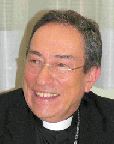 Here is an excerpt from an interview of Cardinal Oscar Rodríguez Maradiaga, Archbishop of Tegucigalpa in Honduras and president of Caritas Internationalis, with the television program “Where God Weeps” of the Catholic Radio and Television Network (CRTN) in cooperation with Aid to the Church in Need, reproduced in a Jan. 10, 2011 press release by Zenit.org:
Here is an excerpt from an interview of Cardinal Oscar Rodríguez Maradiaga, Archbishop of Tegucigalpa in Honduras and president of Caritas Internationalis, with the television program “Where God Weeps” of the Catholic Radio and Television Network (CRTN) in cooperation with Aid to the Church in Need, reproduced in a Jan. 10, 2011 press release by Zenit.org:
Q: Latin America is not without challenges. You yourself stated that “globalization” is the greediness of the few, which is leaving the majority on the margins of history. Is this something that we can say is particularly acute today, especially now with the financial crisis?
Cardinal Rodríguez Maradiaga: The Holy Father has been repeatedly stating that it’s a crisis of ethics that has left most of the population of our world on the outside. In the beginning, it was like a marginalization, but not exclusion. Today there’s not even a margin for them. I am the president of Caritas Internationalis, so I know that the U.N. Food and Agriculture Organization said there was no money to alleviate poverty in the world. Seven billion dollars would have been enough, and one month later, they were giving $600 billion to save some of the banks of the world, and they’ll never stop pouring money into the “sack” because it’s a ripped sack. They still haven’t touched the bottom, and they continue pouring and pouring money into it. If you divide the $600 billion dollars between the 6.5 billion inhabitants of the world … poverty would disappear immediately.
 In this special issue of the journal, MICHAEL, the reader will discover who are the true rulers of the world. We discuss that the current monetary system is a mechanism to control populations. The reader will come to understand that "crises" are created and that when governments attempt to get out of the grip of financial tyranny wars are waged.
In this special issue of the journal, MICHAEL, the reader will discover who are the true rulers of the world. We discuss that the current monetary system is a mechanism to control populations. The reader will come to understand that "crises" are created and that when governments attempt to get out of the grip of financial tyranny wars are waged. An Efficient Financial System, written by Louis Even, is for the reader who has some understanding of the Douglas Social Credit monetary reform principles. Technical aspects and applications are discussed in short chapters dedicated to the three propositions, how equilibrium between prices and purchasing power can be achieved, the financing of private and public production, how a Social Dividend would be financed, and, finally, what would become of taxes under a Douglas Social Credit economy. Study this publication to better grasp the practical application of Douglas' work.
An Efficient Financial System, written by Louis Even, is for the reader who has some understanding of the Douglas Social Credit monetary reform principles. Technical aspects and applications are discussed in short chapters dedicated to the three propositions, how equilibrium between prices and purchasing power can be achieved, the financing of private and public production, how a Social Dividend would be financed, and, finally, what would become of taxes under a Douglas Social Credit economy. Study this publication to better grasp the practical application of Douglas' work.  Reflections of African bishops and priests after our weeks of study in Rougemont, Canada, on Economic Democracy, 2008-2018
Reflections of African bishops and priests after our weeks of study in Rougemont, Canada, on Economic Democracy, 2008-2018 The Social Dividend is one of three principles that comprise the Social Credit monetary reform which is the topic of this booklet. The Social Dividend is an income granted to each citizen from cradle to grave, with- out condition, regardless of employment status.
The Social Dividend is one of three principles that comprise the Social Credit monetary reform which is the topic of this booklet. The Social Dividend is an income granted to each citizen from cradle to grave, with- out condition, regardless of employment status.Rougemont Quebec Monthly Meetings
Every 4th Sunday of every month, a monthly meeting is held in Rougemont.